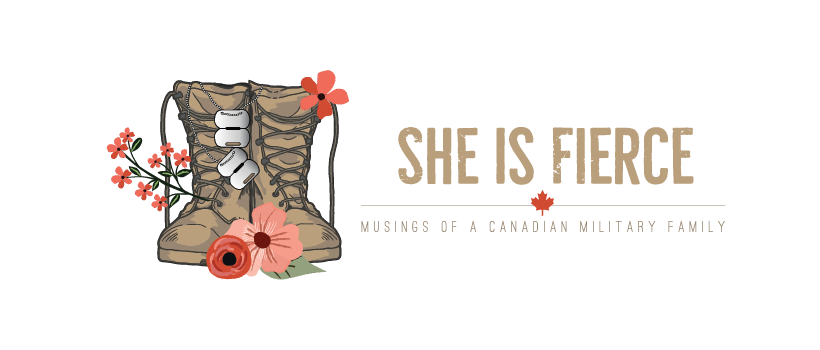Panic, you’re posted! (But first…)

So you’re facing a military posting this year.
And let’s face it, this might be your first or your 10th and there’s a lot of fear around relocation in general, but this year, it’s even worse. BGRS has changed and panic has ensued. Panic.
Will it be as bad as we think? I hope not. I can’t fix Brookfield, though. I can’t fix anything, I’m just along for the ride same as the rest of you (except, you know, we aren’t posted this year so bless your hearts). No matter how many panicked comments and private messages I receive, so far I have not been granted any special powers by DND.
If I had, I would be sure to tell you. Preferably from a megaphone while on my helicopter.
However I am reminded of a friend who supported me once during a deployment. I was pregnant and miserable. She kept asking how she could help and I kept telling her that I just wanted my husband home. Finally, frustrated, she said “I can’t DO that, so tell me what I CAN do.”
So here it is friends.
There’s a good chance there will be more than a few issues with the new relocation system.
I’m sorry.
We can’t necessarily fix that right now.
We can talk about it, encourage each other on it, be sure to get out as much info as we can to make it as pain free as is humanly possible, make sure evaluations get to the right people, inform the chain of command and the powers that be of all our issues as they happen to us, but we can’t just snap our fingers and make that system different.
What we can do, however, is look for some of the other services out there that can help make relocation a bit less stressful this APS.
I spent weeks calling people, and emailing people, and harassing people, and I was able to get interviews with the managers and communications directors and heads of all kinds of fancy departments with acronym names, and put together a list of some of those services we might not even realize are there.
Grab that bottle of wine the movers wouldn’t put in the truck, pour yourself a plastic hotel glass full and let’s see what’s out there.
5 services you should know about BEFORE you move this APS:
-
MFS and your MFRC
Every single location where military families live has an MFRC (Military Family Resource Center) or MFS office in charge of the area. For most, it’s right next to the base the member works at. For others at isolated, reserve or OUTCAN postings it might not be that easy. But there is always an office out there.
I know, I know. You have *tried* MFRCs. You’ve had bad experiences. They don’t have the exact thing you were looking for. They let you down.Well, friends, try again. They don’t have what you wanted in childcare options, or single adult options, or deployment support? Well, maybe they’ve changed staff. Or policy. Or Director. Maybe this posting means a new MFRC you’ve never tried. Maybe they have something else that might be useful that you haven’t heard about. Maybe now there’s online support you’d be interested in, or they have a new quilting group, or this new location has totally different services. Writing off all support services because you had one or five bad experiences? Well, that’s an option, but it’s not really hurting anyone but you. If all else fails? Maybe you should consider joining the Board to see about making some changes from the inside.
Your local MFRC/MFS office has different support services depending on location. Everything from employment offices, to childcare resources, deployment support and language service. Some MFRCs have welcome packages that will get to you before you ask, some have welcome packages they need you to request. The onus is on you. Look them up here. Call them. Follow them on facebook, twitter, sign up for their email newsletters, ask them in person. Sit down with them and become familiar with all they have to offer. They may have access to things like vetted childcare provider lists, employment counselling, special needs parenting support, second language training, and social programs like parent groups, coffee breaks or even online book clubs to help you build your community. You won’t know unless you ask.
You might need it now, you might need it later, knowledge is always useful. Take charge of that.
MFS (Military Family Services) falls under Canadian Forces Moral and Welfare Services (CFMWS), which overseas MFRCs and supports military families at a national level. Be sure that you follow them, too, as they often host online webinars on variety of subjects that can be useful. Interested in knowing more about some of their programs? Check out their website, join their facebook group at #myvoicemonvoix or call the Family Information Line at 1-800-866-4546 (00-800-771-17722 international)
-
SISIP
SISIP stands for the Serviceman’s Income Security Insurance Plan. Which no one knows, but may be why we most often associate it only with the life and disability insurance military members are required to have that comes off their pay every month.
However, SISIP offers much more than that. I had a chance to speak with Christine Racine, who is a Client Services Support Financial Counsellor. She speaks directly to members as well as oversees the financial counsellors who support members, from all over the country. She is an absolute wealth of knowledge (pun intended) and she had a lot to add about what SISIP can do for families during relocation.
When you receive a posting message, your SISIP advisor can sit down with you and show you a budget template that includes the average cost of living for your new location, average housing and rent costs, and even help you figure out any pay changes you will experience with the loss or addition of benefits like Post Living Differential (PLD), Land Duty Allowance (LDA), Sea Pay or Flight Pay so you can budget for them.
SISIP works with the Support our Troops (SoT) fund and can access eligibility, help you fill out applications and manage short-term loans, lines of credit or grants you may receive. An SoT loan may even be accessible in the cases of posted members who have not received their relocation debit cards in time, or are having other issues with the relocation system.
SoT offers grants for emergency situations as well as for families experiencing financial need due to a family member’s special needs. This can include times when members are relocated and experiencing a disruption of special needs services due to provincial wait times. SISIP can assist with these grant applications.
Christine was also incredibly helpful in providing general financial information, like the danger of payday loans, the benefits of budget making, how-tos for bankrupcy avoidance, different banks mortgage rates, the uses for consolidation loans, and virtually any other financial questions you might have.
I have to say, of everyone I chatted with Christine was the most forthcoming, easy to talk to, and informative. A trip to the SISIP office to meet with an advisor and seeing how one can help your transition could be a huge benefit for any family.
-
Calian Military Family Doctor Program/Operation Family Doc
I have to admit, knowing where the needs for doctors are the greatest, I was always a little sceptical of the Calian Military Family Doctor Program. None of the locations offered or added seemed to be the ones that needed doctors the most, so it didn’t make a lot of sense to me when I was under the impression they were contracted to make doctors appear for us.
That’s because I was totally wrong.
Thankfully, I was able to briefly chat with Melanie Holek, General Manager over at Calian’s medical property management division, Primacy, so she could clear up a few things for me and explain how this worked. In 2015 Calian, a national company who works closely with the Canadian Armed Forces, approached them about how they could use their own Primacy clinics to support military families. This led to the creation of the Military Family Doctor Program. This means that Primacy leveraged the doctors that already practice in their clinics across the country to assist relocating military families in finding a physician (though demand may mean there are still wait lists in some areas). The current locations where you can access this program are Calgary, Comox, Edmonton, Esquimalt, Kingston, London & Southwestern Ontario, Mainland BC, Moose Jaw, Toronto, and Winnipeg.
Unfortunately, this did not mean that Calian, or Primacy, could create doctors out of thin air to the areas of the country most in need.
Currently, according to those in charge of the program, they are working on ways to expand to hard-to-place areas, but this is not as easy as it sounds and is an evolving work in progress.Calian, and Primacy, took on creating this program by reaching out to their network of physicians and asking them to expand their practice to take on the families of the serving military, without compensation from the DND, as a way to give back to the military community, and have placed over 1000 military families with physicians since it’s creation.
See their website with more info, available locations or how you can enroll, here.
If you are posted to Ottawa, there is also Operation Family Doc. This was created in partnership with the Academy of Medicine Ottawa (AMO) and connects those military families posted to Ottawa with family doctors accepting patients. If you’re in the Ottawa area you can connect to this program here.
I know, I know, Gagetown and Halifax and Petawawa and the rest of you living places where this program is not, who have been waiting for years for doctors, this doesn’t help you. I’m sorry. Hopefully, that comes soon and I encourage you to use your own experiences to talk to the Ombudsman and your local MP regarding the critical shortage of family doctors in those areas in the hopes there will be new programs available in coming years.
Until then, if you’re posted to Ottawa, or a place on the Calian list, be sure to take advantage of this service. -
Children’s Education Management Program
UPDATE:
While spring break, time differences and busy lives had made contacting Heather Mace. the Senior Education Officer over at the CEM program hard at first, I was able to chat with her this week and got some great info. Members contacting CEM generally have a response within 24 hours, so the staff at the program can help out when you need it.
There are a handful of links for forms that have some difficulty opening, especially if you aren’t using Explorer (which, everyone admits, no one does). However, if you right click and save the links and open from your computer, you’ll be able to read them.If you’re posted overseas, the CEM program will aready be involved with your family during the screening process and to help the transition to the new school. But CEM can also be a support within Canada. There are a ton of reasons that if you haven’t already been referred to the CEM program, you might want to give the website a look.
Wondering what age your child would start Kindergarten in a new province, or options for special needs programs or preschool?
What the different requirements might be for a high-school age kid to graduate depending on where in the country they are posted?
Maybe your child needs some support with French or English language schooling depending on their first language.
Or your child is headed to university and you’re interested in looking at scholarships.
These are all areas the Children’s Education Management Program can support you with.Even better: DO YOU LIKE CHECKLISTS?
Well I do. I really, really do. I’m the loser walking around with my posting binder collecting everything and checking off to-do lists all APS. As a parent it can be hard to decide what info to gather to bring to the new school that the teachers would find most useful. Well the CEM website has a checklist for that! Check it out here!
Man I love checklists.Here’s something new I learned.
Did you know that in some cases, you are entitled to claim tutoring costs for your child if they are struggling academically in the first year of a posting to a new province?
You may also be entitled to language training for your child if their move requires them to be educated in another language (French or English).
There is also the possibility for funding for tuition and/or travel costs for a child to stay behind if the family is posted to another province during their graduation or pre-graduation year.
See the facts on these funding options here.
You can check out everything on the Children’s Education Management Program here, or see their contact info here.
The best way to make first contact with them if you’re not sure where to look, or just have a general question and are wondering if they can help, is to email them at CEMGEE@forces.ca -
Each Other
I mean, you knew I was gonna slip this one in, right? Friends, we are our own best resource.
That means we need to get out there at our new location.
On social media? Hit up your MFRC page and any local groups. Ya, ya, sometimes they are catty and ridiculous. Doesn’t mean they can’t be a wealth of info and place to meet others. Many of them have files within the groups on local programs, services, numbers, etc. There’s usually plenty of people with older teens or even those adults who offer childcare that you can connect with and interview in advance for the times you may need them. They are also a great way to crowdsourced local shops offering needed home repairs services, or vehicle inspections, or any of the other 500 little things you need when you arrive at your location.
Place of worship your thing? Attend one! Have small children? Hit up some local play groups! Get involved with the local library. Community watch. Martial arts gym. Community garden. Running club. Volunteer with the MFRC or your children’s school or the local SPCA or outdoor club. Take up knitting. Fill your house with Paint Night masterpieces. Friends, no judgement, if your thing is a grown up Pokemon play group or an adult community munch, or a Rush fan club. You do you, find the people who also do themselves in similar ways, and build your community.
Basically, do something you enjoy that other people also enjoy.
Key? When you’re there you need to talk to people for this to work.
Doesn’t work the first time? Try something or somewhere else.Resiliency is on us. All the programs in the world aren’t going to make the nights less lonely or the deployments shorter or the solo-parenting less stressful. Having friends, however, ones that can text late at night after a depressing call from theater, who can swap childcare for much-needed grocery trips, who can give you a kick in the ass when you need it? Those are what will get you through.
I wish I had a magic wand to create a perfect relocation system.
Truth is, I couldn’t if I tried, that’s one of those things that’s better left for people much smarter and more experienced than I. As many opinions as I have, ruling the world would be a tough job and one I’d for sure fail.I know none of these services fix the problems, they won’t make it easier to get ahold of an agent or speed up a card in the mail or explain the website or get you back the money you lost on the last house sale.
I can’t do anything about any of those things.What I can try, however, is to continue to encourage all of us to make the most of the one thing that no policy or program or broken debit cards can take away.
Each other.
Which means that all the infighting and the drama and the martyr olympics my-move-was-harder-than-yours garbage has to stop.
Instead of wasting energy on that, use that energy to ask questions and look for resources available to you. Call or drop into the MFRC. Make phone calls to things like the Family Info Line and ask what’s out there. Be your own best advocate. You deserve it.
Then, when you see the gaps, speak up about what’s broken. Don’t scream, or curse (too much), or just spew anger. That won’t get you heard.
Instead, band together. Find a command team member or an MP or an Ombudsman or post on #myvoice or do all of those things. And if you don’t hear more, do it again.
Brainstorm working solutions. Be prepared to discuss positives and negatives and compromises.
Most of all, do it alongside one another, because that’s the most important truth of all of it.We’re in it, for better or worse, together. And we are stronger that way.
UPDATE: See? We can make change. It happened and the overwhelming feedback from families meant the Relocards were put away. Let’s keep the comunications open, keep being heard and keep encouraging positive change.
Comments
About The Author
reccewife
Comments
Related posts:
Related Posts
Relax
Relax, mom. Relax. Just stay home. Except if you need to work. There’s…
Comments
Related posts:
Pre-Deployment and the Clone A Willy
Yes, you heard that right. So to start, let’s get it out of…







Leave A Comment